Text
Having a thought about Jadis and how she's described by the Beavers in The Lion, the Witch, and the Wardrobe -
It's interesting to go back to LWW after reading The Magician's Nephew with the knowledge of Jadis's real backstory. Her specific origins are still a bit vague, but it's confirmed that she's from a different dimension and very reasonable to assume that she is not human as the Beavers say. But are we meant to presume that the other things they say about her are true? I mean about her being descended from Lilith and giants. Even if we're meant to think Jadis's origins are Biblical, the details Mr. Beaver gives don't match canon Biblical literature. Lilith, who isn't mentioned in the Bible but emerged as a figure of medieval Jewish folklore, was human like Adam, she just ran away from Eden and then was banished when she wasn't willing to return and submit to Adam, and she hooked up with demons to give birth to more demons and took revenge on Adam and Eve's children. Nothing about her being a Jinn, which doesn't even come from Jewish or Christian tradition. A djinn is a supernatural being from pre-Islamic paganism that was coopted into Muslim beliefs.
Jadis's alleged biology comes from a hodgepodge of beliefs that a scholar like C.S. Lewis would probably know is a lot of mythological salad. So I'm inclined to believe that the Beavers' notions about Jadis's heritage are just wrong but have been passed along as "common knowledge" by generations of Narnians. Which raises an interesting point: the Beavers can be factually wrong about Jadis in certain respects, but that doesn't make them wrong about her moral character. In contrast, we have Edmund who tries to convince himself that Jadis is not evil and that her enemies are telling tales to make her look bad. He might be right that this story of Jadis being half jinn, half giant is incorrect and invented by people who hate her. However, this doesn't change the fact that Jadis is a bad person. We might be tempted to presume Jadis is evil because she's an almost-human inhuman creature, as the Beavers do. Thanks to TMN, Lewis invites us to question that line of thinking without questioning the truth about Jadis's morality.
1 note
·
View note
Text
And they made their father drink wine that night: and the firstborn went in, and lay with her father; and he perceived not when she lay down, nor when she arose.Genesis 19:33
Pretty sure this is nsfw. Personal email only.
New rule everyone in the us is assigned a different Bible verse to be theirs. I'm tired of everyone signing their emails off with Joshua 24:15. Some of y'all are going to have to settle for a begat to hang on your wall alongside your "live laugh love" woodcut. Sorry
1K notes
·
View notes
Text
Every time The Chosen has the disciples bicker I'm just like <3 <3 <3 Global Christendom
#i love it#i also love when jesus dips out during the bickering#like same lord#the chosen#the chosen series#the chosen tv series
10 notes
·
View notes
Text
Whew, got 2 chapters edited and uploaded today. I'll try to get at least one done tomorrow. Stay tuned!
Chapter 4: A Cold Kingdom
Excerpt -
Ice and water break. They swallow Hel into their suffocating embrace. For a few moments, the shock of impact, not to mention the cold, stuns her. The first string of escaping air bubbles bursts her into action. Her limbs slash through the water in desperation. She squirms and spins, losing the surface, facing the dark depths and the pushing current. She swirls again, again, losing air, every second nearer to drowning—
Light. Faint light, but she flies to it, fights every ounce of water. She burns to her bones to survive. Her heart screams that she won’t make it in time. Her head feels thick as her consciousness is strangled.
Help me. Someone …
Her living hand shoots into frigid air. She pushes down, splashing the surface. Her head rockets above. Grasping, coughing, almost vomiting, crying from the iciness squeezing life out of the vulnerable side of her body. She’s losing feeling. The other side, nonliving and already senseless, moves and takes charge to claw her way to the nearest riverbank. She grabs the shelf of snow. Despite a flash of anticipation that it will break and drop her back into the water, it holds. She climbs out.
Oh, how dark it is. Even with the white landscape, a tundra with steep mountains along its distant edges, inky gloom sits like a pot lid over her head, over everything. The sky is a deep gray that might be clouds, but above that she can’t help but believe that the vault above the clouds is either earth or the base of Yggdrasil. There must be breaks in that dome, though. How else did she fall through it into the river? It’s hard to think about geography when she’s shaking so fiercely. Her teeth are knocking together with such insistence that the noise drowns out her musings.
One other peculiar characteristic of the ground, as her feet soon notice, are the mounds. Not big mounds, but noticeable. At first, she assumes they’re natural hills. Some are small enough to trip on. Others require a minute to hike over. But their roundness, their regularity in shape, if not in size, eventually gives her pause. She feels like she’s walking through a settlement full of sleeping souls. Her gut knows it. She’s walking over a mound as the understanding hits, and she scrambles off.
They’re here. Buried. But they couldn’t be. Their souls should be here, not their bodies. Yet she is here in body—a very cold body that might expire if she doesn’t find shelter. Is there any chance she’s not the only living creature in this realm?
“Hello?”
2 notes
·
View notes
Text
the ressurection account is full of fearful, trembling men and women. full of doubt, weak of faith. fear in the garden, fear at the cross, fear at the tomb, fear at the ressurection, fear even in the face of the greatest of news.
jesus loves well his fearful, doubting saints. he comforts them, he thinks of them, he cares for them, he cooks for them, he greets them by name.
1K notes
·
View notes
Photo

Harrowing: A Combined Retelling of Tales from Norse-Pagan and Christian Tradition
Hel, daughter of of the trickster Loki, has been ruling the inglorious dead for millennia after being sent to Niflheim by Odin. She’s the half-living, half-dead queen of humans, giants, dwarves, elves, werewolves, and even a frightening species of horned trolls with a taste for wicked souls. With help from them, the terrible serpent Nidhogg, her witch mother Angrboda, and the murdered god Baldr, she tries to ensure that her subjects continue their afterlife in relative peace.
That peace is upended by the arrival of a human named Yeshua. Not only does he claim to be a god - one that Hel had a terrifying encounter with long ago - but he tells the humans that he can set them free not just from Hel but death itself. No one can do that, certainly not without Hel’s say-so.
What should be a simple story of enemies, power, and opposing ideologies quickly becomes complicated. The fates of humans and other races hang in the balance, and the most surprising fate awaits Hel herself.
#reblogging bc i'm up to chapter 11#warning: it's a lot of hel backstory#but hey i got the flood in there so#give it a whirl#harr0wing
21 notes
·
View notes
Photo
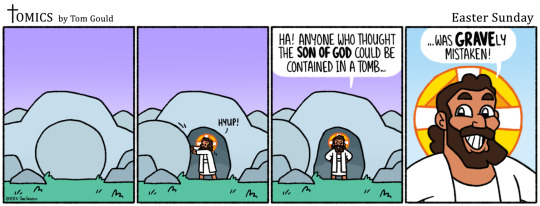
04/04/2021
Jesus, Jesus, rise on Easter,
Kick the devil in the keister!
Keep reading
2K notes
·
View notes
Photo
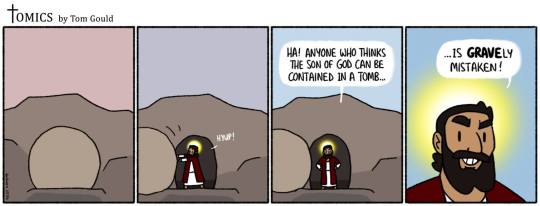
A little late, but hey, it’s still Easter.
8K notes
·
View notes
Text
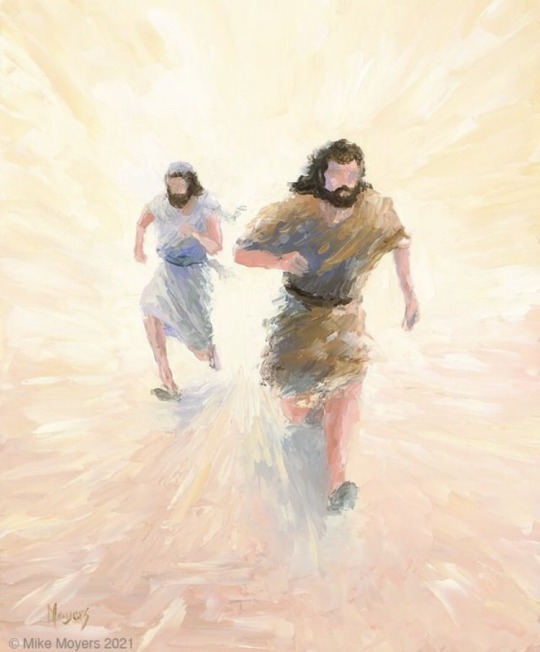
Race to the tomb.
1K notes
·
View notes
Text
Got an anon ask with spoilers for The Chosen S4, so read more under the cut!
Anon:
It kind of feels like Thomas' arc of dealing with loss is too much of a repeat of Peter's arc in season 3. I mean, we already know from scripture that dealing with loss isn't going to cause Thomas' faith to end in tragedy. So I can understand those who say that his arc should have been given to someone else. Perhaps to Judas or Schmuel, but this time it should end in tragedy.
I see what you mean - why not have a storyline where someone who believed in Jesus lost their faith after a painful personal loss? That's fair, but it's just a different storyline that I don't think invalidates this particular choice for Thomas, and here's why (imo).
What I'm seeing in the show so far with Thomas's grief arc is that it has either further effects or is meant to set up an interesting explanation for moments in Scripture. Namely -
When Thomas says, "Let's go to Bethany so we may die with him." In the Gospel of John, the situation and dialogue is as it's portrayed in the show (Jesus & disciples just evaded getting stoned to death by the religious leaders), only I think the understanding is that "him" refers to Jesus, showing Thomas's stalwart loyalty that intriguingly contrasts with his later doubt. In the show, it plays the pronoun game a bit by making it sound like Thomas could be talking about Lazarus, not Jesus. But more importantly, the emotion is different. Having Thomas say this out of depression rather than loyalty paints such a different picture - a more flawed, grief-stricken one that holds no optimism or heroism. This is a controversial take in itself, tbh, which for me makes it interesting to discuss.
What this means for his doubt later on. What will actually make Thomas doubt in Jesus's resurrection? Because he can't open himself to hope? Because he almost doesn't want to believe it out of anger and pain? I honestly can't predict the answer, and that makes me interested to see it play out
It tests his friendships with the other disciples. I don't consider this the same arc as Peter's because Peter barely interacted with the disciples during that storyline. I see Thomas's reaction being different: he's not physically dipping out on meetings like Peter did, but he's emotionally and mentally absent a lot of the time. Gradually, he's more receptive to help from others while still feeling stuck. This prompts Peter, John, Jesus, and others to decide how they're going to respond to their friend's pain. It shows Peter trying to step up as "the Rock" and understand what that role means. Having Thomas's arc just be about tragically losing his faith in Jesus (whether he gets it back or not) would be kind of shallow. Yes, people can lose their faith during grief, but how do they go forward anyway? How do their friends try to help them? I feel like with Judas or Shmuel this arc would ONLY be about grief and giving up on Jesus. Not saying those arcs are not worth seeing, but I can understand why the writers saw more potential in developing characters and relationships on a wider scale, not just with one person.
If they were to give this arc to someone other than Thomas, I would not pick Judas. We know how Judas's story will end, and if the idea is to be left guessing how things will play out, I'd rather see it for a character for whom I don't know the outcome rather than someone for whom I know it ends badly. Like maybe Tamar, or even Johanna since we don't actually know what happens to her post-Gospels. We do know other unnamed disciples of Jesus fell away, not just Judas. Judas was the only one in "the twelve" who had such a dramatic falling out. Anyway that's my taste, not an objective take on storytelling.
4 notes
·
View notes
Text
Hey, Chosen fan who ships Andrew and Johanna (sorry forgot your username) ... after seeing season 4 ep 5 I think you may be onto something 😁
Spoiler talk under the cut
I mean it's only the scraps any rarepair fan might gobble up, but I'm gobbling them. Right at the start of the episode, a mysterious package is delivered to the disciples, and after some absurd speculations about what it might be (part of me was scared it was John the Baptizer's head tbh), Andrew finally opens it and reads the note inside, and it's from Johanna! Because of course it is! Full of nice stuff for them to sell and fund the ministry.
The cute part is that in the note Johanna addresses "Andrew and Simon" which gets Simon Peter in a huff because HE'S the oldest, why isn't HE mentioned first?? Logically it's bc Johanna knows Andrew better, both being disciples of John. Still, it's sweet that Johanna wanted to mention Andrew first. And Andrew got all happy while reading her note.

But here's what I'm thinking now: a storyline where Andrew and Johanna actually develop a romantic connection, but she's still married to Chuza. How would they handle that? How would Jesus help them negotiate that situation? If you look at the Gospels, Jesus is generally big on no divorce. However, he recognizes the stipulation for adultery. Now, technically, in the ancient world, adultery could only be committed by a woman, and the understanding was that the man had the right to divorce an unfaithful wife, not necessarily the other way around. But knowing Jesus, who when he talked about divorce was being especially disapproving of men who dumped their wives for very little reason, he'd recognize that Chuza is committing adultery and, if he's not willing to change, Johanna should be free to marry someone who will be faithful and devoted to her. At the same time, such a relationship for Johanna (be it with Andrew or otherwise) might not be possible right away given the cultural climate and limitations to women's agency. So that could present a strain and challenge for Johanna and her love interest, resisting the temptation to commit adultery herself and putting her in a perilous position when she's already endangering herself by association with Jesus. Oof, so much drama potential!
0 notes
Text
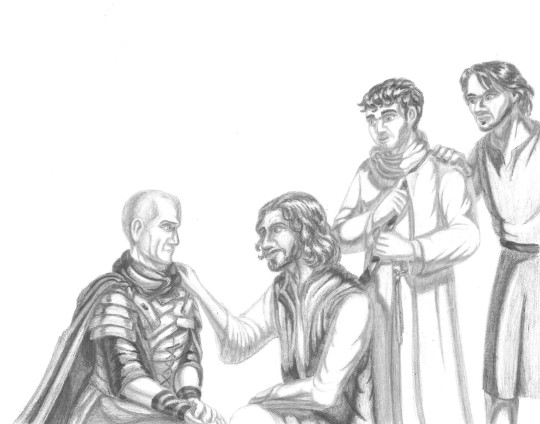
Happy Easter!
In Christ we can find healing.
I have not seen season 4 of The Chosen yet, but I can't wait for the scene where Gaius comes to Christ. It's got to happen!
(My drawing isn't finished just yet, but I thought I would share what I have so far for Easter.)
#happy easter!#the chosen#the chosen series#the chosen tv series#oh boy wait till you see season 4 :)
7 notes
·
View notes
Text
Why are you distant, beloved? The veil is torn.
#good friday#sorry i should've reblogged this yesterday ;-;#but i think it counts for#holy saturday#easter vigil
15K notes
·
View notes
Text
The most devastating and heartwrenching thing about the Last Supper is that Jesus knew that His disciples, His friends will betray him. Still, He washes their feet, and still, He gives them His blood and body.
And this is the tragedy of God, that He dies for those who are not just abstractly imperfect and who have done something nasty, He dies for people who betray Him daily.
He says: here, I give you the Kingdom, to you who betray me, here, I give you the Kingdom, I've bought it for you with my blood.
And this is the tragedy of Man, that He must carry all that sorrow in Himself, in His human body (it is unthinkable for humans, impossible). And the sorrow evidently eats Him alive, He tries to comfort Himself in His last hours, so He spends them with apostles. Jesus is eager to find a shoulder to lay His head on, a shoulder to cry on. But He has no one to share the sorrow with who won't betray Him, He is alone in that. He has no one who would even understand His sacrifice, oh no, no one would even care to stay awake with Him.
So He turns to the Father, He prays and prays and in His last moments, it's only the Son and the Father who are left. But even the Father leaves Him. Everyone leaves Him, Everything leaves Him. Candles out, it's dark, the Saturday will be quiet.
432 notes
·
View notes
Photo
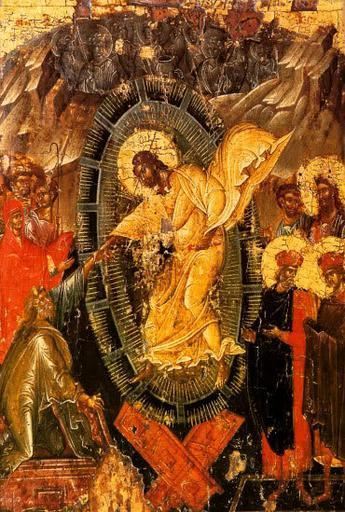
There is a tradition that Christ spent the interval between death and resurrection ‘harrowing Hell’ - redeeming souls lost there…
“After death, Christ descended into Hell to help lost, wounded and wandering souls suffering there. He didn’t shun the darkness in which humanity struggles, soul seeks its lost treasures, and new light is born.
So, too, our dark nights of the soul can be where we find illumination - and discover the empathy which gives birth to ‘com-passion’ as (literally) the ability to ‘suffer with’ others.”
~ Maureen Roberts
[Ian Sanders]
16 notes
·
View notes

